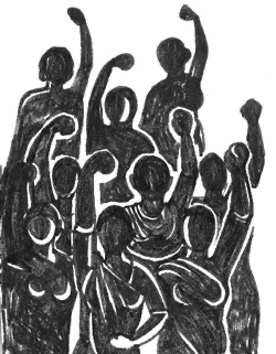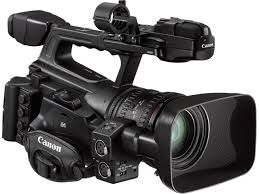
The Black Workers For Justice grew out of the 1981 struggle of three Black women workers, Mildred Davis, Christine Smith and Luvenia Cooper, against retaliation and discrimination at a K-Mart department store in Rocky Mount, NC. It was from this foundation of fightback that the organization that became BWFJ established as a central pillar recognizing the triple oppression and exploitation of Black women workers: as women, as workers and as Black people. This includes the full participation, development and leadership of women in the labor movement and the Black Liberation Movement as well as sisters’ rights and responsibilities to participate in the planning, maintaining, organizing, education campaigns and leadership within our organization. When BWFJ wrote “Where We Stand”, our creed and program of BWFJ, we made sure to include a point on the equality of sexes and against sexism.
In 1985,The BWFJ Women’s Commission (WC) was organized by black women workers to deal with women workers’ issues, both BWFJ organizing campaigns and inside BWFJ itself. Some of these issues include sexual harassment and discrimination on the job, making sure organizing campaigns are conducted in a way friendly to women workers, representation in trainings, demonstrations, recruitment and other activities, etc. Some of these campaigns include:
The WC initiated and led the several year long organizing campaign at Rocky Mount Undergarment factory, where the majority of workers were women. We leafletted, produced a newsletter, helped the workers build their organizing committee, helped recruit a national union and run the organizing drive. The drive was lost narrowly but many women came out of it much more confident in their own abilities to stand for justice. The plant ultimately shut down and workers dispersed to other workplaces but we were able to maintain relationships with several and recruited one of our staunchest BWFJ leaders, Sis. Ida Mae Boddie in the process of that work.
Other campaigns that women have had critical impact were the re-hiring of activist Ms. Ina Mae Best at Goldtex in Goldsboro, NC from retaliation for her leading role in a union drive at the plant; women workers and organizers played the key roles in the struggle for severance pay and benefits for Schlage Lock workers in Rocky Mount, NC. Women of the Women’s Home Extension Club in Shiloh, NC were pivotal both in the environmental and health & safety struggle at the Koppers wood processing plant there as well as the struggle to maintain the integrity of the Black Community from gentrification and Research Triangle Park corporate expansion. Women lead the environmental struggle against Hanor Farms hog operations in their Battleboro, NC community. BWFJ women have lead the Area-Wide Peoples Health Screening Clinics in Bloomer Hill, Fremont and Shiloh communities. Inside the organization, we have challenged and improved methods of meeting, organization, style and campaigns.
We published the booklet, “Women Workers are Leaders, Too”, which became used as part of BWFJ’s Member Orientation.
From the late 1980s through to the mid 2000s, the BWFJ Women’s Commission organized International (Working) Women Day activities. International Women’s Day is March 8. We would hold activities on the weekend closest to the 8th, bringing in women speakers from other countries who were in sharp struggles for workers’ rights, women’s rights or national liberation that year. Some of the places were Cuba, South Africa, Palestine, Mexico, Mali, Part of the events were always Women’s Speak Outs where women got the opportunity to speak about issues and conditions on the job, at home or in the community that they were facing. We always included workshops to train in public speaking, how to put together a basic flyer, chair a meeting and other issues as they came up.
One of the important aspects of these Speakouts and International Women’s programs is that male members and supporters of BWFJ would organize and handle the food preparations and serving, childcare and help with transportation. This impacted a number of sisters greatly: it showed visible support of the organization for the commission, it freed up commission members to concentrate and participate on program, planning, politics and execution. But a good number of women remarked that they had never seen men take on those roles and be openly supportive of women organizing and it opened their eyes to new, more balanced roles between men and women and views of acceptance of Women’s leadership.

In 2003, we organized the International Women’s Conference in Atlanta, Georgia. Women came from 18 countries, including Senegal, Mexico, Germany, Southern Africa, Brazil and others and the similarities in issues generally were amazing!
In 2019, we led the coalition that organized the march in Greenville, NC, “Solidarity with the Squad” answering the attacks by the Trump regime on the progressive US congresswomen Alexandria Ocasio-Cortez, Ayana Pressley, Rashida Tlaib and Ilhan Omar.
In BWFJ, women lead or have participated in leadership of Black Workers For Justice: the Organization Secretary, Director of Organization, Editor & Cheif of Justice Speaks newspaper, one half of the Executive Committee, international delegations to Cuba, South Africa, the Workers & Community Assistance Committee after Hurricane Floyd, environmental justice organizing, and cultural work leadership. BWFJ women have served in union leadership in the NC Assoc. of Educators, the Greenville Letter Carriers union, as well as United Electrical Radio and Machine Workers Union, Local 150. As part of BWFJ ’s overall 2020 Strategy Plan, we are re-tooling, expanding, re-focusing the Women’s Commission as one of the key BWFJ Working Groups.
I



